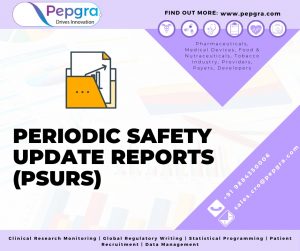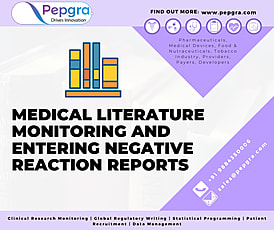Introduction
- PSURs are pharmacovigilance documents that provide risk-benefit balance assessment.
- The notion of PSUR is to offer a wide and complex evaluation of risk-benefit balance of a medicinal product.
- PSUR reporting first came into existence in 1992.
- Purpose of PSUR is to provide an update of global safety experience with a specific pharmaceutical.
- It is imperative to consult the guideline on good pharmacovigilance practices (GVP) while preparing PSUR.
- MAHs are supposed to submit all PSURs in EU to the central PSUR repository.
PSUR; What is it?
Periodic Safety Update Reports (PSURs) are nothing but pharmacovigilance Service documents that are intended to offer an assessment with regards to the risk-benefit balance of a specific medicinal product at time points that are predetermined, following its authorization. The key idea of the PSUR is to offer an extensive and vital evaluation of the risk-benefit balance of the product, while taking into consideration novel or emerging information related to safety in the context of increasing information pertaining to benefits and risks. The European Medical Agency as well as other national competent authorities evaluate information that is contained within PSURs to understand whether there were any new risks recognized for a medicine and or / if there has been a change in its benefit balance. With the help of a PSUR evaluation, it is possible to determine whether any additional investigation for a particular issue were required, or whether an action was essential to safeguard the health of the general public (for instance; an update of the information that has been offered to patients as well as healthcare professionals.
PSUR; Origin and Recognition
The notion of PSUR reporting is said to have taken root from 1992. It has found recognition and is noted at diverse platforms. This is also inclusive of the International Conference of Harmonization (ICH) and the European Union and it has been noted that PSUR reporting has not matched pace with the due developments that have taken place in pharmacovigilance literature search like electronic adverse event reporting, and planning for risk management.During the year 2010, an awareness of such type has led to alterations in European Legislation laying down the needs for PSUR reporting. On the basis of a study conducted in the past, regarding determinants of safety associated
regulatory actions for bio-pharmaceuticals, it was found that evaluations through PSUR contributed to around 38 per cent of post-authorization regulatory actions within a sample of bio-pharmaceuticals. Furthermore, during the year 2010, it was found by that around 64 per cent of selection of adverse drug reactions (ADRs) stemmed through PSURs. The said two studies scrutinized the contribution of PSURs to recognized safety signals, that do not offer any insight into the manner in which PSURs are responsible for the purpose of safety monitoring, or the percentage of PSURs that results in regulatory action.

PSUR; Purpose
The onus of keeping track of the bio-pharmaceutical products rests on the shoulders of Marketing Authorization Holders (MAHs), once they are in receipt of authorization for marketing. It is well-known that MAHs are continuously engaged in dialogue with regulators to make sure that the appropriate strategies are deployed to optimize the advantage to risk ratio of their products. One of the key tools that are put to use to enable the post-authorization communication amongst MAHs and regulators is the PSUR. The purpose of PSUR is to offer an update of global safety experience with a particular pharmaceutical. This also includes data from safety data from observational and interventional studies, spontaneous reports along with other information pertaining to safety[1].The purpose of PSUR is also to proactively analyse, present and assess novel or altering safety related data from any source assessed with regards to estimates of product exposure, though the overall coverage of data sources would have restrictions in terms of practice.
PSUR; Preparation
The preparation of PSUR is an arduous and intricate procedure and requires much care and consideration. Keeping in mind the fact that PSURs are supposed to be prepared by MAHs, it is imperative that they mandatorily consult the ‘guideline on good pharmacovigilance practices (GVP): Module VII – PSUR’. Further, to facilitate the proper and appropriate preparation of the PSUR, the European Medical Agency has created an explanatory note to GVP module VII, that all MAHs are expected to consult at the time of preparing periodic safety update reports. The proper preparation of the PSUR will tackle particular problems in the European Union evaluation procedure for products that are nationally authorized. However, the issues could also be applicable to products that have been authorized in a central manner.
PSUR; Submission
Legal necessities for PSUR submissions had been setup through regulation (EU) No 1235/2010. Directive 2010/84/EU and in commission implementing regulation (EU) No. 520/2012. The PSUR format adheres to the structure that has been outlined in the Implementing Regulation Article 35 and module VII of the guidelines of good pharmacovigilance practices (GVP) offers guidance on the preparation, submission and evaluation of PSURs. The particular format is mandated by law for nationally authorized products (NAPs) and centrally authorized products (CAPs)[4]. Marketing Authorization Holders are supposed to submit PSURs as per the data lock points that have been duly published within the EURD list. The legislation brings in derogation for routine PSUR reporting for specific products. Till such time that there is a particular condition within the authorization, or it has been mentioned to the contrary in the EURD list, there is no need for routine PSUR reporting,particularly for medicinal products that have been authorized as per the articles of Directive 2001/83/EC.
As on 13th June, 2016, it is necessary for MAHs for submit all PSURs within the EU to the central PSUR repository by utilizing the eSubmission gateway / web client. It is compulsory for MAHs to utilize the PSUR repository for centrally as well as nationally authorized medications, irrespective of whether it is following the single assessment of the EU or a purely national process of assessment.






